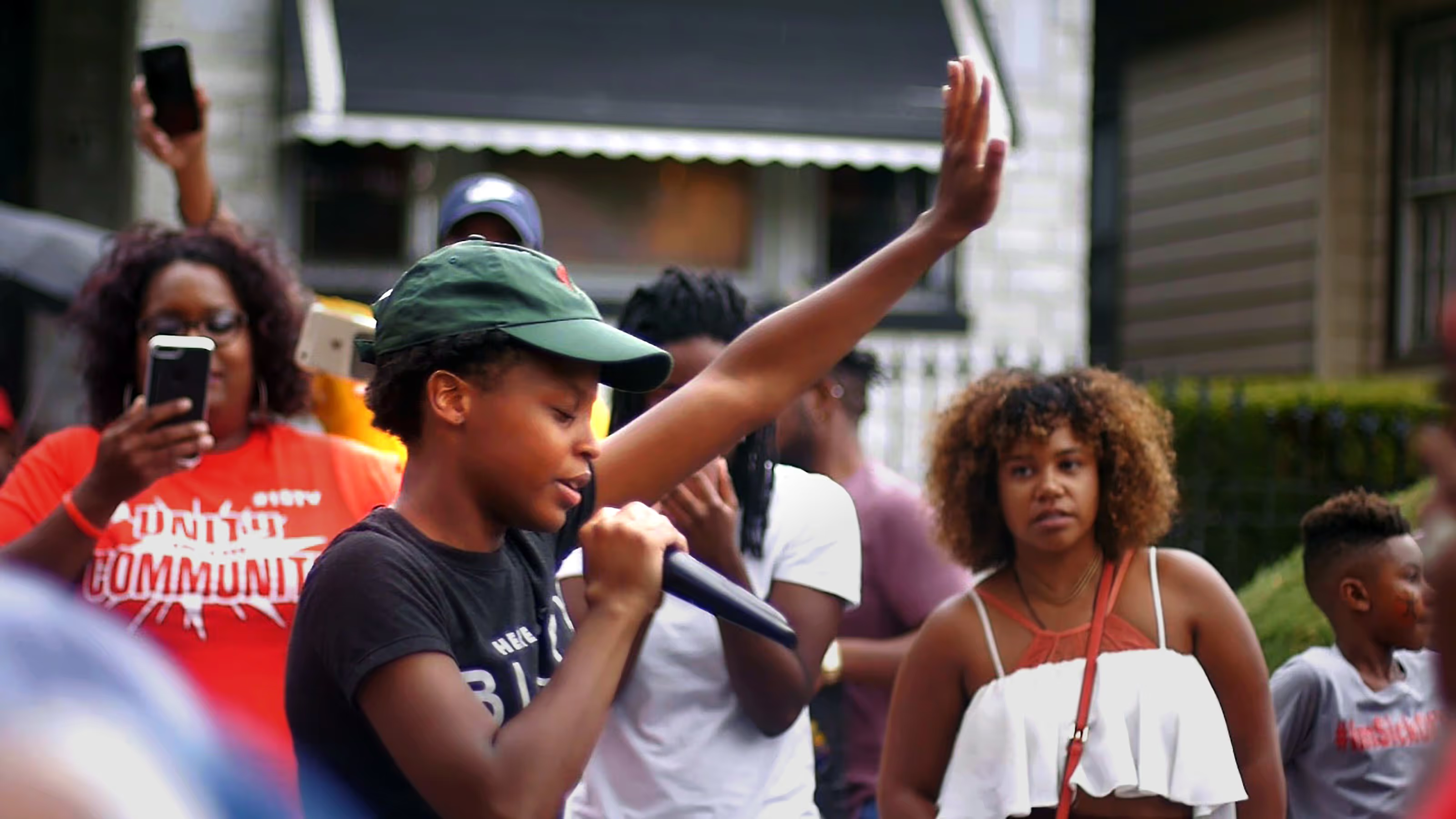Unapologetic Discussion Guide
Film Summary & Using This Guide

Film Summary
After two police killings, Black millennial organizers challenge a Chicago administration complicit in state violence against its Black residents. Told through the lens of Janaé and Bella, two fierce abolitionist leaders, Unapologetic is a deep look into the Movement for Black Lives, from the police murder of Rekia Boyd to the election of Mayor Lori Lightfoot.
Using This Guide
This guide is an invitation to dialogue. It is based on a belief in the power of human connection and designed for people who want to use Unapologetic to engage family, friends, classmates, colleagues, and communities in conversations about racial justice, community organizing, feminism, and justice beyond punishment and imprisonment. In contrast to initiatives that foster debates in which participants try to convince others that they are right, this document envisions conversations undertaken in a spirit of openness in which people try to understand one another and expand their thinking by sharing viewpoints and listening actively.
The discussion prompts are intentionally crafted to help a wide range of audiences think more deeply about the issues in the film. Rather than attempting to address them all, choose one or two that best meet your needs and interests. And be sure to leave time to consider taking action. Planning next steps can help people leave the room feeling energized and optimistic, even in instances when conversations have been difficult.
For more detailed event planning and facilitation tips, visit https://communitynetwork.amdoc.org/.
Helpful Concepts & Definitions
- Abolition: a political vision with the goal of eliminating imprisonment, policing, and surveillance and creating lasting alternatives to punishment and imprisonment.
- Accountability: people thinking about the ways they may have contributed to violence, recognizing their roles, acknowledging the ways they may need to make amends for their actions, and making changes toward ensuring that violence does not continue and that healthy alternatives can take its place.
- Black Queer Feminist Lens: a political praxis (practice and theory) based in Black feminist and LGBTQ traditions and knowledge, through which people and groups are able to bring their full selves into the process of dismantling all systems of oppression. This lens supports individuals and communities in creating alternative modes for living and being rooted in their lived experiences. By refusing to be governed by oppressive systems and historically racist and patriarchal structures, those being led by a Black Queer Feminist Lens effectively prioritize problems and solutions that center (and are led by) historically marginalized people in communities. It is an aspirational and liberatory politics that acts on the basic notion that none of us will be free unless all of us are free.
- Community accountability: a process in which community members such as family, friends, neighbors, or co-workers work together to transform harmful situations and how the community responds when harm is caused. This can also describe a process in which the community recognizes that violence has an impact on it, even in situations where the violence is primarily between individuals, and those individuals may have participated in allowing the violence to happen or even causing the violence and the community is responsible for resolving the violence.
- Community organizing: a process in which people come together into a group that acts in their collective interests to address specific problems through long-term strategies.
- Femme: a descriptor for a queer person who presents and acts in a traditionally feminine manner. All femmes hit upon two key aesthetic and identity-related traits: being feminine and falling somewhere on the LGBTQ spectrum.
- Gender-based violence: any act that is perpetrated against a person's will and is based on gender norms and unequal power relationships. This encompasses threats of violence and coercion. It can be physical, emotional, psychological, or sexual in nature, and can take the form of a denial of resources or access to services.
- Genderqueer/gender fluid or nonbinary: terms that may be used by people who identify as neither exclusively male nor exclusively female, as a gender other than male or female, as more than one gender, as no gender at all, or whose gender changes over time.
- Intersectionality: concept that describes the ways in which systems of inequality based on gender, race, ethnicity, sexual orientation, gender identity, disability, class, and other forms of discrimination “intersect” to create unique dynamics and effects.
- Misogynoir: term coined by queer Black feminist Moya Bailey to denote, in her words, “both an historical anti-Black misogyny and a problematic intraracial gender dynamic that had wider implications in popular culture. Misogynoir can come from Black men white men and women, and even other Black women.”
- Prison Industrial Complex: term used to describe the overlapping interests of government and industry that use surveillance, policing, and imprisonment as solutions to economic, social, and political problems.
- Queer: according to Jennifer Patterson writing in Queering Sexual Violence, “a radical position within the larger mainstream LGBT community; a commitment to exposing the systems that criminalize rather than serve. It’s a space to dream up new systems that do serve us. For me, it is a rejection of mainstream ideas around sexuality and gender and the home to critical thought organized through radical love and compassion. It’s also an umbrella term that offers more flexibility than something a bit more fixed like gay or lesbian.”
- State violence: direct harm and abuse perpetrated by people in positions of authority within institutions that people are required to engage with or depend on, as well as the structural harm resulting from neoliberal public policy, rules, and regulations.
